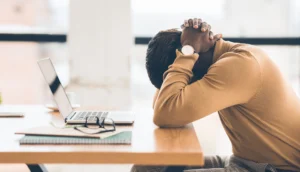If you’re asking yourself ‘what are signs of depression,’ this article will provide key indicators to help you identify the condition. Recognizing signs like persistent sadness, changes in appetite, and physical pain can make a big difference. Continue reading to learn more about the physical, emotional, and behavioral symptoms of depression.
Key Takeaways
- Depression is a serious mood disorder marked by persistent sadness and loss of interest, requiring early recognition and intervention for effective treatment.
- Symptoms of depression vary widely among individuals and age groups, encompassing physical, emotional, and behavioral signs that may significantly disrupt daily life.
- Effective treatment combines psychotherapy, medications, and lifestyle modifications, with personalized support from mental health professionals being essential for recovery.
Understanding Depression
Depression is a mood disorder causing persistent feelings of sadness and a lack of interest in activities that were once enjoyable. Clinical depression, also called major depressive disorder, is a severe type of depression that persists almost daily for at least two weeks. This condition can disrupt daily activities, affecting sleep, eating, work, and social interactions. The notable problems caused by depression often lead to isolation and difficulty in maintaining work or relationships, similar to those experienced in bipolar disorder.
Recognizing depression early is crucial, as it is treatable. Early intervention can prevent symptoms from worsening and improve recovery chances. Knowing the signs can help individuals seek appropriate treatment and support.
Common Signs of Depression
Depression manifests differently in each person, making it a complex mental health condition to identify. Common symptoms of clinical depression include persistently low mood, changes in sleep patterns, and difficulty thinking clearly. Some individuals might feel a sense of emptiness and apathy toward activities they once enjoyed.
Changes in appetite are also common, with some people experiencing an increased appetite while others lose their desire to eat. Physical symptoms can include gastrointestinal issues, which are often overlooked but are significant indicators of depression.
Recognizing that depression symptoms vary significantly from person to person is crucial. Awareness of diverse signs like persistent low mood, loss of interest, and physical issues aids in identifying and seeking appropriate treatment.
Physical Symptoms of Depression
Physical symptoms of depression can be just as debilitating as emotional ones. Many individuals with depression experience chronic fatigue, disrupted sleep patterns, and low motivation. These symptoms can make it challenging to carry out daily activities and maintain a healthy lifestyle.
Chronic pain, including joint and back pain, is often reported by those suffering from depression. Youth experiencing depression may exhibit more physical complaints, such as stomachaches or headaches, rather than typical emotional symptoms. In older individuals, depression may present as fatigue, memory issues, or unexplained aches, which can be confused with other health problems.
People with untreated depression often struggle to manage chronic health conditions effectively, leading to a cycle of worsening physical and mental health. Recognizing these physical symptoms and seeking timely mental health treatment can alleviate both the physical and emotional burdens of depression.
Emotional and Behavioral Symptoms
Emotional symptoms of depression often include feelings of sadness, irritability, and apathy. Those experiencing depression may also feel intense guilt or worthlessness, frequently dwelling on past failures. These emotional burdens can become overwhelming, making it difficult to cope with daily challenges.
Behavioral symptoms are also prevalent in individuals with depression. Common signs include withdrawal from social interactions and activities, leading to isolation. Irritability can manifest behaviorally, causing frustration over minor issues and impacting relationships with others.
Recognizing emotional and behavioral symptoms is crucial for identifying depression and seeking treatment. Addressing these through mental health support can greatly improve quality of life.
Depression Symptoms in Different Age Groups
Depression symptoms can vary significantly across different age groups. Recognizing these differences is crucial for early intervention and effective treatment. While the core symptoms may be similar, the way they manifest can differ based on age, making it important to consider these variations when diagnosing and treating depression.
Children and Teens
In children and teenagers, depression often presents through changes in academic performance and increased irritability. Behavioral issues, such as acting out or withdrawing from social activities, are also common indicators of depression in this age group. These signs can sometimes be mistaken for typical teenage behavior, making it essential to monitor any significant changes closely.
Parents, teachers, and caregivers are vital in identifying these symptoms and seeking appropriate treatment. Early intervention can prevent more severe depression and other mental health conditions later in life.

Older Adults
Many people mistakenly believe that depression is a normal part of aging. In reality, depression is not a normal part of aging, and older adults who experience depression often face unique challenges. They may show reluctance to seek help, which can result in depression going undiagnosed and untreated.
Identifying depression in older adults is vital for their overall well-being. Mental health professionals and caregivers should stay vigilant and encourage older individuals to seek necessary help.
When to Seek Help
If you feel depressed, see a doctor immediately. Early intervention usually involves comprehensive assessments of emotional, cognitive, and behavioral aspects, allowing professionals to tailor treatment plans to individual needs.
If there are thoughts of self-harm or suicide, seek emergency help immediately. If you or a loved one is struggling with depression, seeking help is crucial. Early diagnosis and treatment can prevent worsening and improve recovery chances.
Causes and Risk Factors
Depression can be influenced by a combination of genetic, biological, environmental, and psychological factors. Genetic predisposition means that depression can run in families, increasing the risk for certain individuals. Neurotransmitters like serotonin and norepinephrine play a key role in mood regulation and pain perception, and imbalances in these chemicals can contribute to depression.
Traumatic or stressful events, such as abuse or the loss of a loved one, can also increase the risk of developing depression. Chronic stress and psychological factors, including personality traits and coping styles, further affect vulnerability to depression.
Complications of Untreated Depression
In severe cases, individuals might have recurrent thoughts of death or suicidal ideation. The risk of suicide is particularly high among elderly individuals with untreated depression, often due to factors such as isolation and chronic illness. Approximately 90% of individuals who die by suicide have experienced depression or another mental disorder.
Untreated depression significantly increases the likelihood of engaging in risky behaviors, such as substance abuse. It is also linked to higher healthcare costs and can coexist with other health issues like heart disease, including mental illness.
Social isolation is a significant concern, particularly in older adults, as it can exacerbate feelings of loneliness and despair.
Treatment Options for Depression
Effective treatments for depression typically include a combination of psychotherapy and medications. Antidepressants that target both serotonin and norepinephrine can help relieve physical symptoms associated with depression. Selective serotonin reuptake inhibitors (SSRIs) are commonly prescribed due to their favorable side effect profile.
For severe depression cases that do not respond to medications, electroconvulsive therapy (ECT) may be recommended. Transcranial magnetic stimulation (TMS) is a non-invasive procedure that uses magnetic fields to stimulate nerve cells in the brain related to mood regulation. Cognitive behavioral therapy (CBT) focuses on changing negative thought patterns associated with depression.
Lifestyle modifications, such as regular exercise and proper sleep, can significantly enhance the effectiveness of traditional depression treatments. Back Bay Mental Health offers an Intensive Outpatient Program (IOP) tailored for individuals facing mental health challenges, providing structured support while allowing clients to maintain their daily activities. The facility specializes in personalized therapy options, including Acceptance and Commitment Therapy and Dialectical Behavior Therapy, which cater to the unique needs of each client.
How Back Bay Mental Health Can Help
Support from family and friends is vital for individuals undergoing depression treatment. Back Bay Mental Health in Boston, Massachusetts, offers comprehensive services, including a depression IOP in Boston.
The facility provides a range of personalized therapy options, including Acceptance and Commitment Therapy and Dialectical Behavior Therapy, which cater to the unique needs of each client. These therapies, combined with medication management, offer a holistic approach to treating depression and other mental health conditions.
Professional support is crucial in managing depression. The dedicated team at Back Bay Mental Health helps individuals navigate their mental health journey, offering tailored treatment plans and consistent support from a mental health professional to improve quality of life.
Recognizing the signs and symptoms of depression is the first step towards seeking help and embarking on the path to recovery. Depression is a complex mental health condition that can manifest in various ways, but with early intervention and appropriate treatment, individuals can regain control over their lives.
If you or a loved one is experiencing symptoms of depression, do not hesitate to seek professional help. Remember, depression is treatable, and with the right support, it is possible to overcome its challenges and lead a fulfilling life.
Frequently Asked Questions
What are the common signs of depression?
Common signs of depression are a persistently low mood, changes in sleep patterns, loss of interest in activities, and physical symptoms such as gastrointestinal issues. Recognizing these signs is crucial for seeking appropriate help.
How do physical symptoms manifest in depression?
Physical symptoms of depression often manifest as chronic fatigue, disrupted sleep patterns, low motivation, and various pains such as headaches and stomachaches. Recognizing these symptoms is crucial for addressing the underlying mental health issue.
What are the risk factors for developing depression?
The key risk factors for developing depression include genetic predisposition, chemical imbalances in the brain, experiences of traumatic events, chronic stress, and specific personality traits. Understanding these factors can help in identifying and addressing potential vulnerabilities to depression.
When should one seek help for depression?
You should seek help for depression as soon as you notice symptoms, especially if you experience thoughts of self-harm or suicide. Early intervention can significantly improve outcomes.
What treatment options are available for depression?
Treatment options for depression encompass psychotherapy, medications, lifestyle modifications, and specialized therapies such as cognitive behavioral therapy (CBT) and electroconvulsive therapy (ECT). It is essential to consult a healthcare professional to determine the most suitable approach for individual circumstances.




